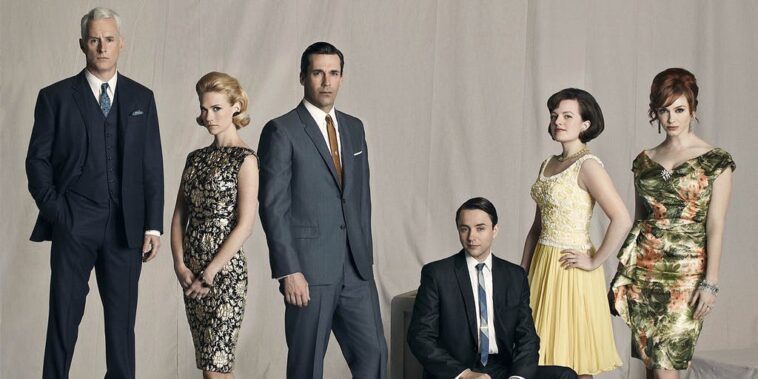There is a reason why Mad Men is considered one of the greatest shows to ever air on television. AMC truly broke the mold when it came to detailing the lives of the advertisers working on Madison Avenue, Mad Men, as they reportedly called themselves. A period drama set predominately in the 1960’s, and despite what its title would suggest, also captures the essence of the women and children that occupy the ad men’s lives. Don Draper utters one of the most iconic lines from the series in the first season of Mad Men, “It’s a time machine.” This statement is true for both the Kodak Carousel side viewer Don was pitching at the time the line was spoken, but it is also true for the series itself. Mad Men takes its audience to the 1960’s where the decade is a character itself, and the people on the show interact with the time in which they live just as they interact with each other.
The 1960’s ushered in historical upheaval, a change in gender roles, and a shift in personal identity all perfectly encapsulated by Mad Men creator Matthew Weiner who also executive produced, wrote, and directed the show. In this way, Mad Men is like a photo album, much like that Kodak Carousel; we can jump ahead in the series, we can look back on what we’ve seen, I for one enjoy a Mad Men rewatch yearly. Every year, I’m more blown away by the series than I was the previous year, and a large part of that is due to the photo album-like quality of the series. Like any expertly laid out photo album, Mad Men reveals to audiences hints for the future in the present. The expert writing and brilliant use of foreshadowing used throughout the entire series of Mad Men is one of the many reasons why the show ranks supreme.
Looking back on the first season of the series, one can see, that through the distinct use of foreshadowing, show writers hinted toward the complexities of the characters and the time in which they lived, in profound and interesting ways, that would be further fleshed out in the six seasons that would follow. The themes explored through the series, and the details about the characters, present themselves in rich bits foretold in the first season as they relate to each character thanks in large part to the accomplished writing of Matthew Weiner, who not only won seven Emmy’s for Mad Men, but also two as a writer on the hit television show The Sopranos. Weiner is an accomplished writer, so much so that a character study into each of his Mad Men players was the perfect way to explore the brilliant use of foreshadowing he employed through the opening season of the series.
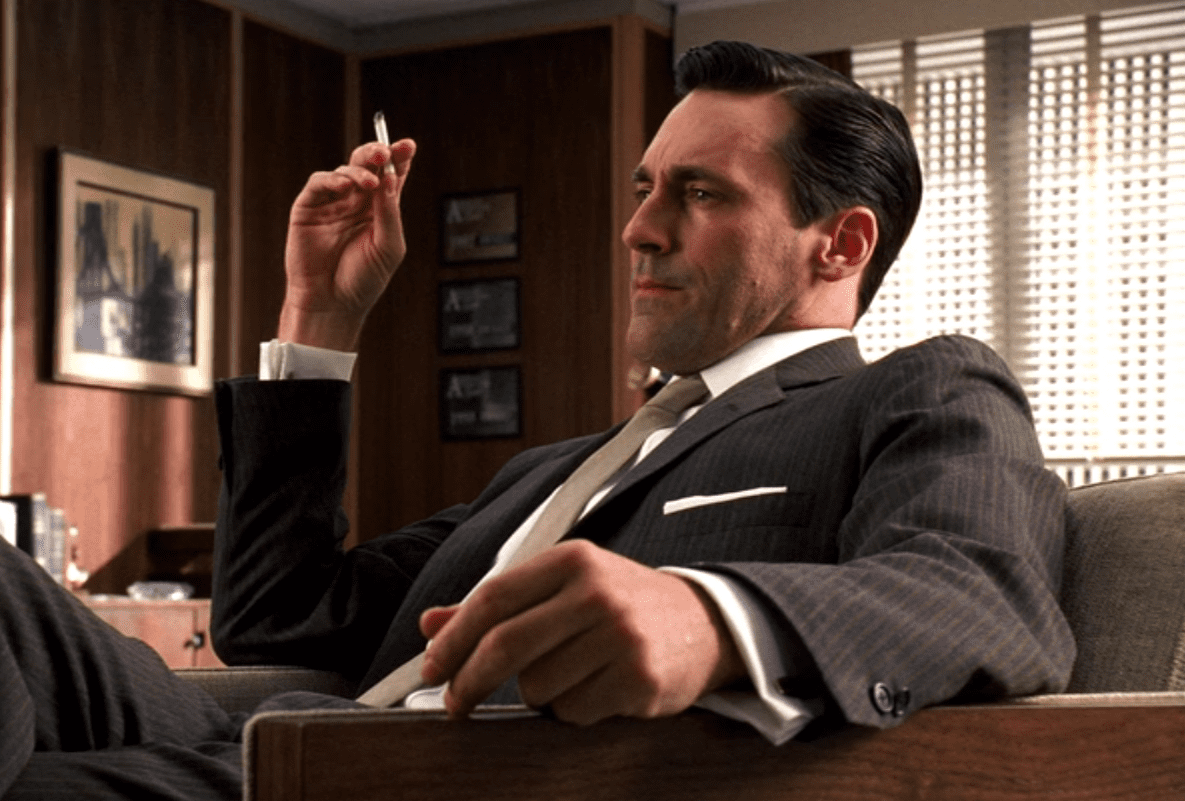
Don Draper
The audience is introduced to Don Draper in the first shot of the series, or at least the facade of Don Draper. It is telling that we meet Don from behind, as he is trying to save his company’s biggest account. Don works as the Creative Director of advertising company Sterling Cooper. Don is praised because he can be trusted to always come up with an idea to keep his account satisfied, even if it is at the very last moment. Don seems to be addicted to the feeling he gets from ideas and crafting pitches. From the first episode on, when Don is hit with an idea, we are shown that the idea comes from the world around him and the people with whom he shares the earth. Don is inspired by the vivid world outside of the office which leaves him feeling confined. “Fear stimulates my imagination”, Don relays after he came up with the saving pitch at the last possible moment during the meeting. The account he was desperately trying to save is Lucky Strike, a cigarette company that is feeling the impact of the surgeon general’s recent revelation that cigarette smoking is damaging to the health of smokers. This is a crucial bit of foretelling showing the audience that Don senses that the times are changing and he is shown fearful of what his place in the world will be once the incoming changes take hold.
From his first interaction with a younger colleague who will do anything to reach the top, one can see that Don is just as uncertain about his future as he is unwilling to discuss his past. The fact that Don is unwilling to sign a contract and discuss his childhood, even with his wife, proves that roots are an issue for him. Though it is a few episodes into the first season before we start to get an idea of what Don’s childhood was like, it is during the second episode where we see he and his wife out to dinner with his boss and his wife that we see Don avoid every opportunity to talk about his childhood each time it comes up. We also learn early in the series that Don is a womanizer, we see him in multiple sexual situations before we meet his wife in the closing scene of the series premiere. His misogyny enters the office as well, as Don cannot handle an assertive woman challenging his place of superiority. He has a tense verbal exchange with a potential client in Mrs. Menken because he does not see her as a fit client simply because she is a woman making the decisions for her department store.
Despite his seeming belief otherwise, Don is no progressive and more than content to keep the societal constructs in place that keep women beneath him. Rachel Menken astutely calls Don out in the first episode because she can see that he does not fit into the world. Don is clearly of the world and not in it, which is why we see him so often in his head and unwilling to create meaningful relationships with those around him. The women he has sexual liaisons with are surface-level relationships and he knows that, which is why he enters them. He will never be expected to make any deeper commitment to these women because he is married, and his marriage is the perfect armor to prevent anyone from getting too close to him. His wife’s questioning him about the details of his life can easily be silenced by his male position of dominance in the 1960’s. Shrouded in mystery, Don has manufactured a life for himself that keeps every person in it a safe and comfortable distance from knowing the real Don. Despite Don using the advertising world to craft what people see and how they see, it and relishing that power, Don seems like an outsider within this world in which he holds the most power as we can often see him working through pitches as a means to work through the difficulties he has with life.
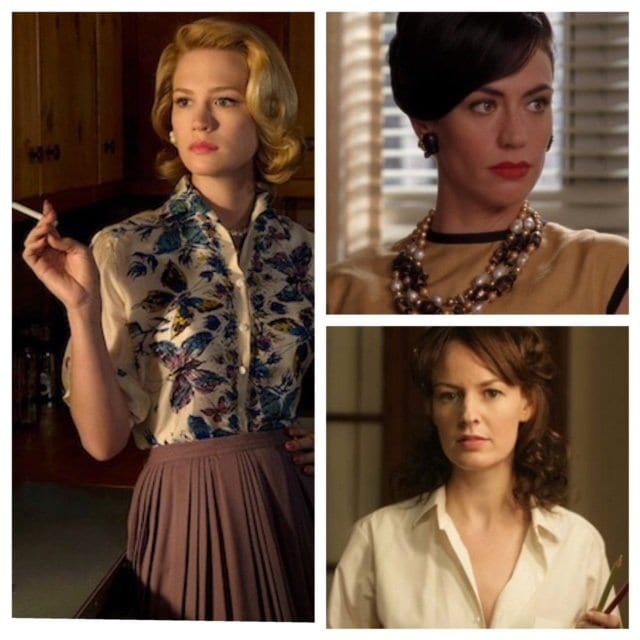
Each sexual tryst Don embarks on acts as a powerful bit of foreshadowing as well. Don is attracted to those who embody a trait he is not in a social position to possess. Don has an affair with illustrator Midge Daniels because he enjoys how constraint-free her life is. If she wants to skip town for a weekend she does it, if she wants to listen to records and smoke marijuana in her apartment, that’s how she spends her night. Nothing is holding Midge to anything in her life, and Don admires her lack of attachment.
Perhaps my favorite scene in the entire series takes place in the first season of Mad Men and is also a genius bit of foreshadowing. In preparation for his daughter’s birthday, Don has been asked by his wife to build a playhouse as a gift. Going back and forth all afternoon to the garage for more beer, Don is struggling just as much to put this playhouse together, as he is to keep his fabricated life together. Despite all of his attempts to control the tools and build the playhouse, it continues to fall apart, an aspect that we are being shown that will correspond to Don’s life throughout the series. Later in the same episode, Don is so out of place in his own home, the home his wife has created, he becomes suffocated and must evacuate. He disappears for hours, unable to confront the sham of his life in front of others and doesn’t come home until dark with a puppy for his daughter to make up for his absence. This tendency of Don’s to run away when he can’t handle the false sense of his own life is something that we will often see throughout the series.
Later in the season when Don asks Rachel Menken to run away with her, she refuses by saying “you don’t want to run away with me you just want to run away.” No matter how well he believes he conceals his dissatisfaction with the life he has made, as soon as someone gets close enough to begin to get to know him, they can instantly see through his act, and the audience is given advanced warning through the brilliant writing and excellent use of foreshadowing used throughout.
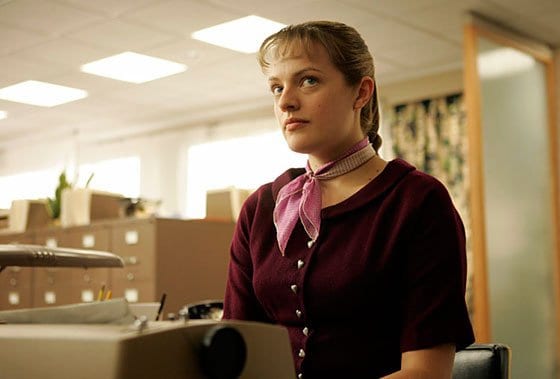
Peggy Olson
We meet Peggy as the newest addition to the office of Sterling Cooper. As a recent graduate of a secretarial school, Peggy is being shown around the office by her supervisor, who is not only quick to tell her aspects of her new job but also how to get along with the men in the office. Peggy is an ambitious, determined goal-oriented individual who is not willing to settle as one of the many faceless women in the office viewed concerning their sexuality alone. Peggy is indicative of the new wave of woman that would come out of the 60’s, those that would take the jobs of men rather than serving men. Peggy comes from a modest background and is a religious, modest and honest individual. When Peggy learns from her supervisor that an unwritten part of her job is to remain sexually available to the men in the office, Peggy is reluctant to assume that added expectation.
Peggy’s earliest reactions both with her female supervisor and the men in her office prove that she has no interest in a man making her way for her. Peggy is not the co-dependent picture of 1960’s femininity using her job as a means to find a man to marry; she is motivated and eager to blaze a trail of her own. Through the urging of her supervisor, Peggy goes to the gynecologist during her lunch hour on her first day–that is how much being sexual was stressed as part of Peggy’s job description. In this brilliant bit of foreshadowing, one of the first scenes that we see Peggy in, we see her on her back in a medical setting, symbolic of the surprise pregnancy and birth we will see her undergo in the first season of the show. We see Peggy unwilling to sacrifice her body for professional gain, we see her take on more projects at work to build a portfolio for herself to ensure she won’t be relegated to secretarial duties throughout her entire working life, and we see her think and act responsibly at all office functions, always unwilling to lose control over herself. Peggy is one of the few women in the office not living only to find a man and achieve wedded bliss. Nevertheless, her one night stand with one of the junior accountants the night before his wedding proved to be a life-changing event for Peggy.
As Peggy gains weight as her pregnancy, unbeknownst to her, progresses, the entire office believes they have a right to comment and offer suggestions related to Peggy’s body. Much of this type of talk happens behind closed doors, but as Peggy is soon horrified to learn, the sexual climate and male dominance of the office means that Peggy will also be criticized about her weight to her face, as well. As we’ve already seen through the first season of Mad Men, however, no unexpected occurrence can derail the motivated Peggy.
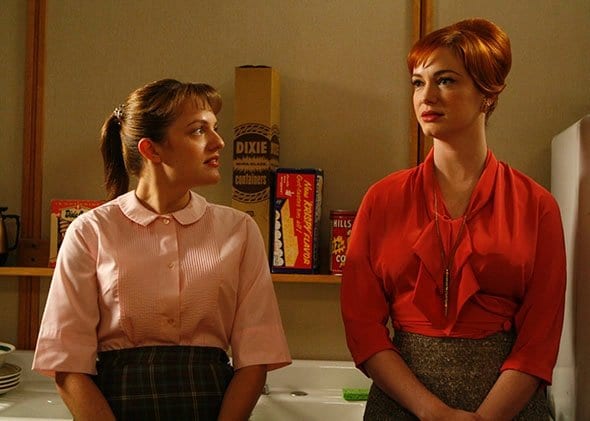
The fifth episode of the series reveals foreshadowing about Peggy as much as it does about Don’s wife. When Betty Draper brings her children to Don’s office before the family is supposed to get photos taken, Peggy is stunned as she didn’t expect them, and Don has left the office without a word to Peggy regarding his whereabouts. Scared and frazzled, Peggy goes to her supervisor who she hopes will tell her what to do. Joan exploits Peggy’s fears and goads Peggy into revealing that Don leaves the office to conduct his many sexual liaisons. After extracting the information she has always assumed about Don, Joan then chastises Peggy for telling her, making it clear that another aspect of her job is to cover for her boss’s infidelities.
All of her intellectual abilities do not go unnoticed, however, when Peggy is finally recognized for her brain during a creative brainstorming session the women are invited to when the men are stumped on creating an ad campaign for Belle Jolie lipstick. Unlike the other girls, Peggy does not relish in the cosmetics testing, but rather crafts a barebones pitch while she is among the ladies in the room. Up until this point, Joan has put off the way Peggy sticks out from the other secretaries as an indication that she will not last long in her job, but the second she is recognized by one of the other copywriters at Sterling Cooper, Joan intervenes in an attempt to prevent Peggy from succeeding in another department at Sterling Cooper. In an instant, Peggy has become a signal to Joan of the changing times and the possibilities being ushered in for women in the company and represents the end of her sexuality reigning supreme at the office.
This early battle and Joan’s attempt to sexualize Peggy acts as a bit of foreshadowing to Peggy’s rise in the company and her character’s role as the antithesis to the subservient female relationship of the women in the office of Sterling Cooper. A role that Joan is all too willing to reinforce as a means to keep herself relevant and in control. When Peggy’s mother practically forces to go on a date with someone from her old neighborhood, Peggy sabotages the date, asserting her dominance over the man who dismisses her role at Sterling Cooper. This date foreshadows the many times in which to come wherein Peggy shows no reservations in standing up to the men that demean her as she climbs her way up the ladder at Sterling Cooper. Don sees this drive in Peggy early, and takes her under his wing without making things too easy for her, but offering helpful advice as Peggy gains her footing in a male-dominated world. When Peggy is found crying in Don’s office, distraught over her adherence to the rules, yet suffering by them, Don recognizes his struggle in Peggy’s and takes some control over the secret Pete has been holding over him, the secret of knowing the backstory of Don’s life. This converging of Peggy and Don’s lives foretells that their paths will cross throughout the series in many unexpected ways and the two will always be a sort of unconventional ally for the other.
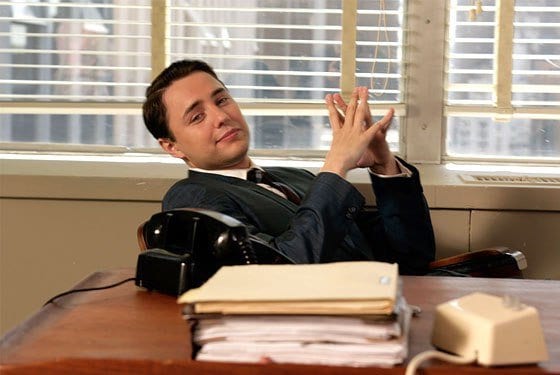
Pete Campbell
A junior account executive at Sterling Cooper, Pete will do anything climb the corporate ladder, even if that means blackmailing the company darling Don bringing about his downfall. Pete is so sure of himself and has been handed everything in his life thanks to his wealthy parents that he believes he deserves a spot at the top and cannot contend with the fact that someone else has already made it there. Besides being entitled, Pete is also just as sexist as every other man in the office, talking down to his secretary and openly disregarding Peggy even after their sexual encounters. Pete operates from a place of assured assertion that he hasn’t yet earned. Pete’s relentless pursuit of success means he will employ any means necessary to overpower the one person that doesn’t kowtow to Pete and his affluent family. Don is unimpressed to find out that Pete comes from money, even after finding out how much his family is worth and what assets they may bring to Sterling Cooper, Don remains uncharmed.
Pete is a womanizer, taking advantage of the women in the office and women in public, with the entitled belief that he has a right to anyone. In reality, Pete can’t measure up for anyone. His parents disapprove of his job and think it is a dishonest way to make a living. His wife, also coming from money, only married him to advance her position as a woman in the 60’s, and is eager to get into the right house in the right part of town to cement her status. Her husband’s meager salary is a disappointment to her, as the two find themselves taking money from her parents to afford a place to live in the city. Pete comes from a position of great privilege, yet despite this, only seems to seek that which he cannot have. Pete’s lack of independence and self-sufficiency likely stems from a life of being coddled by his parents, though, he seems like he wants to begin making his way after his marriage. He is content to wait until the couple has enough money of their own accord to move into the city, but his wife is too impatient to wait and seeks the money from her family. Pete stalls as long as he can before moving, refusing to help his wife decorate or decide on paint colors, grasping at the last opportunity for independence before being indebted to his parents-in-law for the entirety of their lease.
Pete’s childish disposition and inability to mature mean that he is ill-equipped to handle complex adult situations. When Pete sees a fellow ad man gain notoriety after having a short story published, he nags his wife to call in a favor on his behalf so that he can get a short story published as well. He cannot fathom anyone else succeeding besides himself and thinks he is the only one deserving of success.
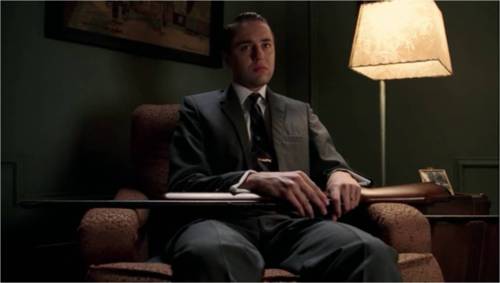
One of my favorite scenes in the entire series details Pete attempting to return a wedding gift behind his wife’s back. Unable to charm the women behind the counter into letting him exchange the gift for cash, he is finally given store credit that he uses to purchase a B.B. gun. as a feeble attempt to retain some of the masculinity he lost at the store, unable to charm himself into what he wanted. This scene explores everything Pete wishes he was. When he bumps into a friend from college, he refers to Pete with an embarrassing moniker. Pete then watches the store employees swoon over his tall, handsome friend.
When Pete is unable to elicit a similar response, his masculinity is fractured, and his place in the world disturbed. Pete senses this kind of underperformance from every area of his life. Despite being given countless chances at work due to the opportunity his last name provides, he still cannot ‘wow’ the clients like Don. Despite swallowing his pride and accepting the help of his wife’s parents to put the newlyweds in a desirable apartment, Pete is then badgered by his in-laws for not yet having children with his wife. The early symbolism surrounding Pete communicated to the audience in subtle ways that Pete’s fragile sense of self and masculinity would have him running from the realities of his life through the entire series.
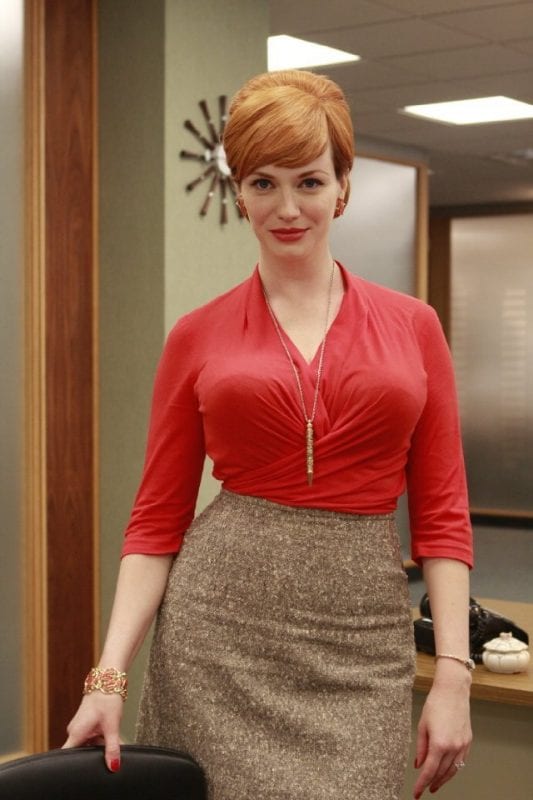
Joan Holloway
The supervisor of the secretarial staff, Joan wields immense power over the women in the office. Joan relishes her position as a woman of the 1960’s pined over for her appearance. Joan is dominant, assertive, and unrestricted by the expectations of sexual monogamy of the 1960’s woman. Perhaps though, as is foreshadowed in the fifth episode of the series, Joan’s sense of assertion and power comes in part from an affair she is having with one of the partners of the company. When Roger Sterling gives control of a meeting to Joan, this is the first time we see a woman exercise a position of power within Sterling Cooper’s walls. Understanding how much the men of the company feed off of power, this gesture was telling as to something going on between Joan and Roger. The first glimpse we are offered that indicate there may be something romantic between Joan and Roger occurs in the pilot when the two keep each other’s eye just slightly longer than usual as Joan introduces Roger to Peggy.
In the sixth episode, suspicions are confirmed when Roger and Joan are shown in a hotel room together after a mid-day tryst. Roger seems to be infatuated with Joan, even struggling to keep his eyes off of her at the office, Joan on the other hand, maintains a distance. In many ways, Joan is a product of her time and determined to keep the status quo as a means of preserving her place in the office, however, in other ways, she’s a woman who only seeks to serve herself. Sometimes, she seems positively in love with Roger, just attempting to maintain a distance to preserve her feelings while other times exploiting her sexuality to get what she wants from the men with whom she comes into contact. Unlike many of the women in the office, Joan is not defined by her relationship with Roger or any other man. Joan makes clear that she is not at the beck and call of anyone, and when Roger invites her to a long weekend at his house when his wife and daughter leave on holiday, Joan refuses and spends the night out with her roommate looking for men to do a couple of things around their apartment.
Joan has feelings for Roger, as she is visibly broken though doing her best to hold her emotions together when she is called in the night to send assurance telegrams to the clients of Sterling Cooper immediately following Roger’s heart attack. As she holds back tears, Bert advises Joan “don’t waste your youth on age” a poignant line for both Joan and the show at large. Joan is also acutely aware of her position in Roger’s life.
Mad Men, as beautifully crafted as it is, the period is as much of a character as anyone in the story, and a viewing of ‘The Apartment’ reminds Joan that she is but an indistinguishable part of his life, as she constantly reminds herself that Roger is likely to trade her in for a “newer model” at any time. Among the women in the office, Joan is the most unsettled by Peggy. Peggy represents a woman that until her entrance has not been at Sterling Cooper, a woman who wants to make a career for herself rather than depend on a man. Initially, Joan discounts Peggy, seeing her inability to grasp her expected role in the office as an indication that she won’t last long in her job. Joan soon sees, however, that Peggy’s reluctance to adopt the sexual expectations of a secretary at Sterling Cooper means that Peggy never had any intentions of fulfilling these roles.
When Peggy begins to be noticed by the creative department and given more responsibilities beyond tending to Don, Joan realizes that the sense of autonomy she saw in Peggy could threaten her position in the company. Queen of the backhanded compliment, Joan refuses to see Peggy’s rise in Sterling Cooper as a way for women to advance in the office and instead cuts Peggy down with each step of the ladder she ascends. Peggy challenges everything Joan has accepted in the world, and attempting to keep Peggy from flourishing is her way of maintaining relevance in a changing time.
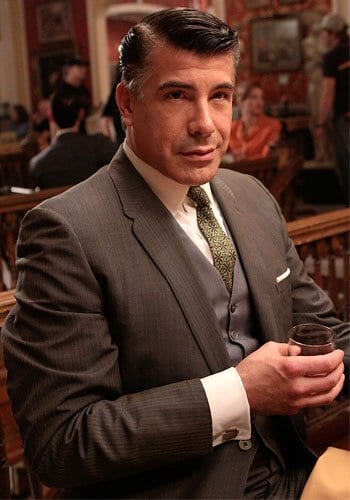
Sal Romano
A fan favorite who left the series all too soon, a wealth of foreshadowing surrounded the character of Sal Romano, art director at Sterling Cooper. Sal, a fluent speaking Italian marks a nice departure from the predominately WASP environment of the office. Sal smokes the most and drinks the most in the office, not an easy crown to wear considering the smoke-filled halls and glasses full of scotch as Sterling Cooper; this may be because Sal has the greatest void to fill. A closeted homosexual, Sal has to work harder than everyone else to give the appearance that he fits in both in his time and among his colleagues. When Sal shows artwork he made depicting a shirtless man lounging in a hammock, he is enamored, while Don tells him to “sex up” the image by drawing a woman instead. Trying to pass as a heterosexual, Sal goes overboard many times trying to convince others of his attraction to women.
Sal’s character is perhaps the greatest example of show creator and writer Matthew Weiner holding a mirror to the nostalgia of the 1960s. He’s reminding us that beyond the picture-perfect relationships and white picket fences were people who were unable to be their true selves because of their sexuality. Sal utters a line which is true to most of the cast, but also acts as a bit of foreshadowing to Sal’s struggle of concealing himself when he says: “We’re supposed to believe that people are living one way and secretly thinking the exact opposite? That’s ridiculous.” Sal is also the happiest of the bunch when he attends a strip club for Pete’s bachelor party, as the club is filled with distracted men providing the rare occasion Sal can be himself and turn his attention to the men that surround him. There is always a hesitation with Sal, however, and when a Belle Jolie representative makes romantic advances, Sal turns him away and leaves. It isn’t safe for Sal to enter a romantic relationship with a man in this period, his job and life would be at risk to engage in a relationship deemed immoral in the ’60s. As a means of self-preservation, Sal denies his truth and happiness.
The ninth episode of the series presents another instance of Sal foreshadowing when he responds in agreement to the discussion about being jealous about living in the white house with a handsome senator. The symbolism and foreshadowing surrounding Sal make it clear that he is hiding something, and moments like the one he shared with Joan when the two of them kiss during a performance of a co-worker’s play as the office staff locks themselves inside the office to watch the election results. Sal’s kiss with Joan is a trophy, as soon as it ends Sal abruptly breaks eye contact with Joan and turns to his co-workers thrilled at the opportunity to pass as heterosexual so publicly. In a world in which everyone wears a mask, Sal, unfortunately, fits right in.
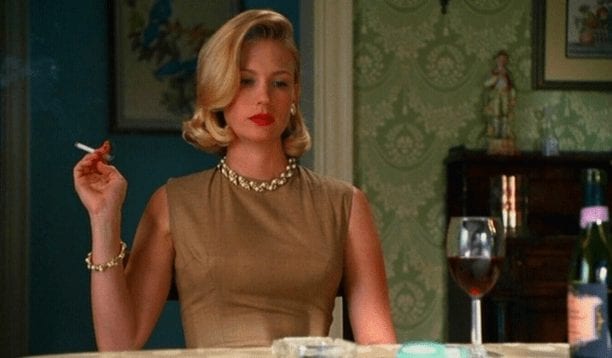
Betty Draper
We don’t meet Don’s wife until the final scene of the series premiere. She is a constant afterthought to Don and his life. Betty is monumentally unhappy, neglected by her husband but expected to keep up the appearance of marital bliss. Betty is expected to care for her home and children while remaining completely available to a husband that neglects her. Don spends most of his nights “in the city” sending Betty’s mind racing as to what he’s up to while she does everything she can to avoid the most likely outcome. Don can’t fathom how his wife who “has everything” could be unhappy, so he reluctantly agrees to her undergoing sessions in the burgeoning field of psychoanalysis. These sessions, too, leave Betty unfulfilled as the psychoanalyst sits with offering nothing during their talks as he had an agreement with Don to report back to him what Betty discussed.
When Betty is out to dinner with Don, Roger, and his wife, the subject of childhood comes up, and Betty presses Don to disclose information just as much as Roger does because she realizes that she knows almost nothing about him. As Betty dresses up for this dinner she attends with Don; their formal attire makes it clear to her that their lives are all appearances and no substance. Like Don, Betty shares the same magnetism to those that embody traits she is too confined to express.
When a divorcee, Helen, moves into the neighborhood, Betty’s friends are intent to ignore her as they speak ill of Helen and fearful that she will come onto their husbands. One example of the brilliant writing of this series lies in the many instances in which the characters speak a line of dialogue about someone else that actually applies to themselves. For instance, during one of Betty’s sessions with her therapist, she confides in him that she is worried for Helen, her house is unkempt, Betty worries about her children growing up without a father, and how Helen can manage a household on her own. Though Betty says this in regards to Helen, she is thinking about what this means for herself. Before Helen moved into the neighborhood, the idea of divorce was a foreign concept; Betty had never known a divorcee. Seeing Helen managing a life without a man seems to give Betty hope that she can do the same in her own life, but she still has worries, like how her children would manage without a consistent paternal presence in their lives and how Betty would manage the bills and the household.
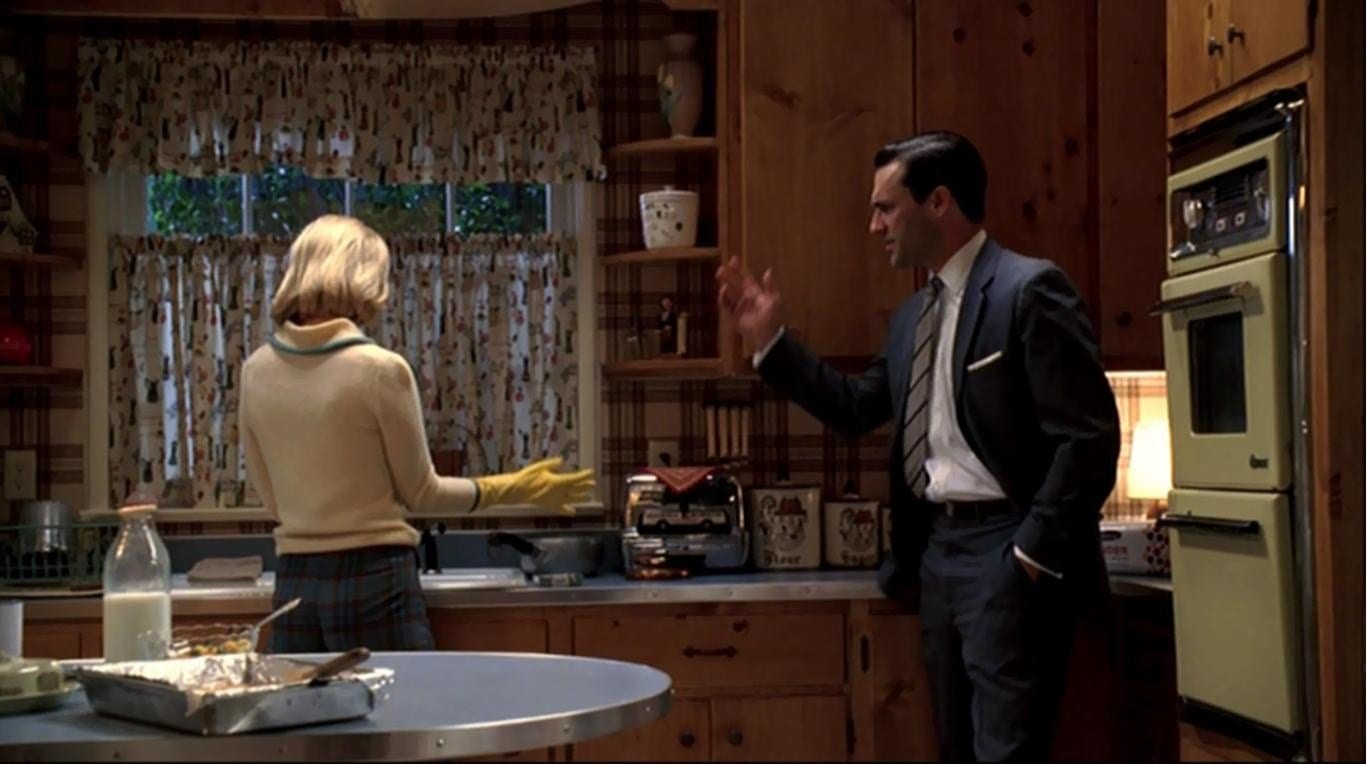
Financially, there is no doubt that Don sustains Betty, but he is incapable of all other support meaning that Betty is already managing a household on her own without the input of her partner. The way she feels about her empty marriage translates to the way Betty feels about her home. Betty finds it difficult to perform the menial tasks of homemaking because she is so burdened by the weight of the void that surrounds her.
Betty also struggles with the weight of what she left behind in her own life. Betty gave up everything, her dreams, and any hopes of a career to marry Don and raise their children. Her therapist discloses to Don that Betty has the mindset of a child, which is why the housework and the childcare are too much for her. Reverting to a time in which she didn’t have as much soul-crushing emptiness and a life dedicated solely to others is the way Betty tries to preserve herself. In addition to all of this turmoil, Betty is also coping with the recent death of her mother, the example she has always emulated of what a woman should be. Unsurprisingly, Don is unsupportive of Betty’s grief as his feelings on the matter are, “Mourning is just extended self-pity.” Don says this to Betty on Mother’s Day, the first since her mother’s death. Sympathy and emotional support are far beyond what Don can muster, even for his wife.
The fact that Betty’s mother’s death is brought up so many times before anyone talks about the person her mother was or any damage she may have done to Betty foreshadows the troubling mindset that Betty brings to parenting her children. After a minor car accident, Betty is immediately worried that Sally may have a scar on her face, disturbing her looks. She goes on to say that it’s okay for a boy to have a scar but the same scar on a girl could completely ruin her looks. Betty also ridicules Sally while crying, as a girl is expected to keep her emotions managed and hidden. As Betty is reviewing the photos from her family’s portrait session, she is displeased with all of them and remarks, “Sally looks fat.” Like Joan, Betty is satisfied with maintaining the social order of the 1960’s, no matter how confined that reality leaves her. Betty’s sense of self-worth is attached to the 1960’s perception of femininity.
When a modeling opportunity arises for Betty, she is given a chance to get out of the house, earn money of her own, and do something solely for herself. Modeling offers an escape from the domestic life Betty was confined to while also providing an outlet for Betty to be appreciated for her beauty that she treasures so much. Most importantly, however, Betty’s worth is restored, and she is allowed to be Betty rather than a wife or a mother. A woman’s worth is often diminished to the roles she serves once she gets married and has children, so the escape was a welcome one for the stifled Betty. Her modeling opportunity was offered as a means to recruit Don to a competing advertising agency and was quickly rescinded when Don decided to stay at Sterling Cooper, relegating Betty to living life as a homemaker again.
When Betty’s best friend confides in her that she discovered her husband was having an affair, Betty can no longer ignore the possibility that Don may be cheating, as well. Betty is shocked to learn that the reason her friend sought her input was that she thought Betty would know what to do. When Betty realizes that her friends think that Don is unfaithful, the pressure of what people think is the push she needed to face the truth. Betty questions Don to no avail, then decides to check his phone records, the same way her friend found out about her husband’s infidelity. Betty calls one of the recurring numbers listed on the phone records and discovers a secret, though not the one she expected. The phone call revealed to Betty that Don has been in communication with her therapist and what was supposed to remain private has been shared. Betty can turn this revelation of mistrust into one that can bring about truth. During her next session, Betty discusses Don’t infidelity with her therapist knowing it will get to Don so she will never have to face him and discuss his cheating. This ability of Betty’s to remain steadfast in the direst situations, and turn them around to grow or bring about something positive is a gift we will see throughout the entire series.
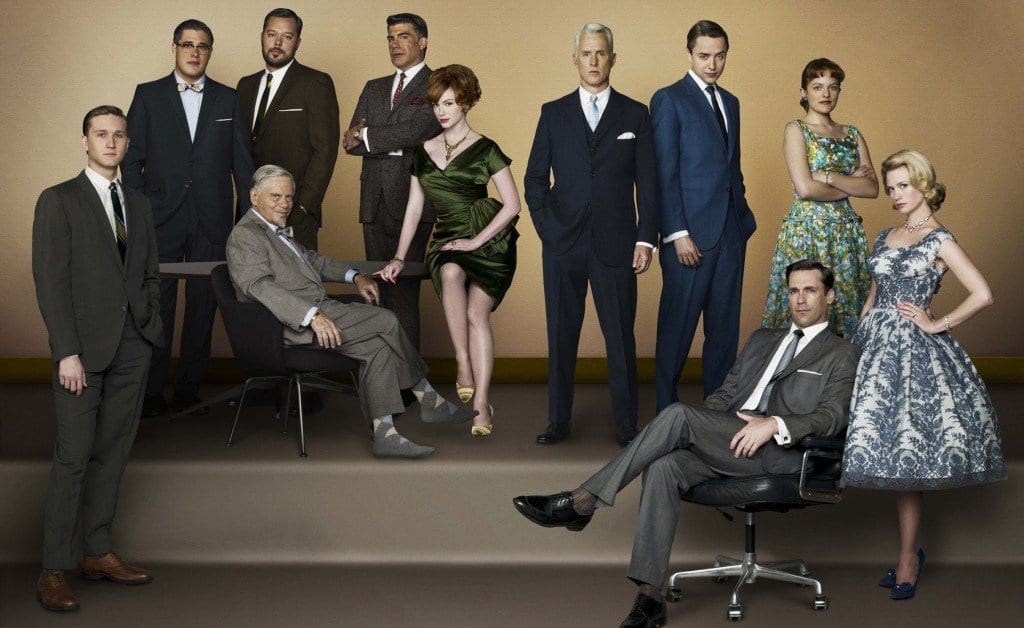
Each character in the Mad Men series was so richly developed and the first season was brimming with foreshadowing making it clear to see why audiences would be engaged in the series for six more seasons to come. When a show is so well-crafted with such incredible writing, it lends itself to multiple rewatches. I enjoy a yearly rewatch of Mad Men because there is something else to discover and some bit of symbolism that I didn’t catch on the previous revisit. Identity, self-preservation, finding oneself, and adapting to a changing time are all heavy themes, and each handled with extreme care and attention in Mad Men. Going forward in the series, the societal constructs and the limit of the self, death, the future, and the desire to leave a legacy are additional themes approached in the series. Such issues are made all the more captivating by the glimpses provided as to what the fully fleshed-out characters we met from the first season would have in store for them as the series progressed.

